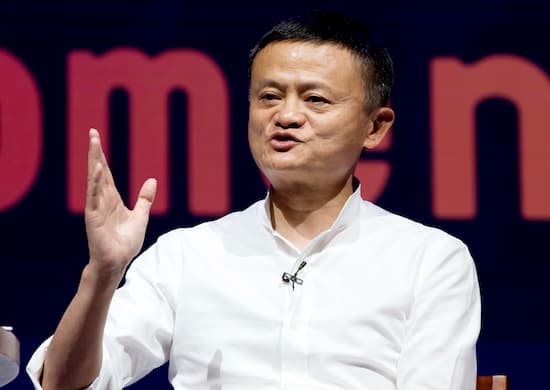Hong Kong Shares Tumble on a Case of Mistaken Identity, Highlighting Beijing’s Economic Vulnerabilities
While the Communist Party encourages innovation because it’s good for business, Beijing at the same time increasingly tightens control over everything, including innovators’ free thinking.

Stocks tumbled at Hong Kong markets this morning after news emerged of Jack Ma’s arrest. Although the man in custody proved to be someone other than Communist China’s most famous entrepreneur, the incident points to Beijing’s economic weaknesses as it strives to overtake America as world leader.
China’s state-owned television, CCTV, reported today that a man named Ma was taken into custody in Hangzhou for allegedly using the internet to harm national security. Stocks of the Jack Ma-founded Alibaba, China’s equivalent of Amazon, were sold in panic, shaving some $26 billion off their value.
Fearful of losing a golden egg, Beijing’s powers-that-be quickly clarified that the Ma in question is not the Alibaba Group’s founder. The group’s stock rebounded, and markets were quickly calmed.
Yet the incident is indicative of China’s fundamental economic conundrum: While the Communist Party encourages innovation because it’s good for business, Beijing under Xi Jinping at the same time increasingly tightens control over everything, including innovators’ free thinking.
The party bosses, rather than the sky, are the limit — and that’s bad for business.
Investors immediately assumed this morning that the person in custody was the famous Jack Ma. They did so in part because the arrest was in Hangzhou, Mr. Ma’s hometown. It’s where he founded Alibaba and where the group is still headquartered.
Beyond the location, people are aware of how Beijing has recently worked to clip Mr. Ma’s wings, so a much-publicized arrest seemed quite plausible.
Mr. Ma is the kind of entrepreneur that most governments can only dream of. With innovation, imagination, and hard work, such a person can create great leaps forward for any country’s economy. Think Henry Ford, the early Hollywood moguls, Steve Jobs, Jeff Bezos, Elon Musk — then combine them, and you get Jack Ma.
Like other internet-age barons, Mr. Ma started his business after he discovered the potential of the new technology while visiting America in the 1990s. Eventually he became one of the world’s wealthiest men — his current worth is estimated at $37 billion.
Like Amazon here, Alibaba cornered China’s web-based retail market. In the process, Mr. Ma became quite the rock star. The born-showman entertained huge crowds at open-air stadiums with wit, charm, and an electric guitar as a prop.
In 2018, Mr. Ma announced his retirement from Alibaba to promote, he said, educational work, philanthropy, and environmental causes.
By late 2020, Mr. Ma’s Ant Group was the world’s largest financial technology company and he planned to take it public. Then Beijing took notice when, in a public appearance at Shanghai, he compared the country’s banking system to an “old people’s club.”
“Today’s financial system is the legacy of the industrial age,” Mr. Ma said in his speech, urging Beijing to “set up a new one for the next generation and young people,” and concluding with: “We must reform the current system.”
The party bosses didn’t let such criticism go unpunished. The Ant Group’s public offering was abruptly canceled, and then Mr. Ma disappeared from the public eye. To quiet speculations, he reappeared several months later in a short video clip that looked to many like a hostage tape. Afterward he has been seen briefly here and there, but “the speech” apparently ended Mr. Ma’s stardom days.
“Jack Ma is no fool,” an American businessman who worked in Hong Kong at the time told the Sun recently. The businessman, who asked not to be identified, added, “Jack Ma knows the limitations of his powers in the Chinese system, so he’s laying low, mostly in Hong Kong. Don’t expect him to make waves anytime soon.”
A Japanese diplomat who often travels to China described the method for gathering economic data there: A village party boss relays his hamlet’s growth numbers to a county clerk; the clerk then passes them to a superior; up the ladder they go until the numbers make it to the desks of Beijing’s top party functionaries. At each stage, the person reporting pads the data to make him look good to his superiors.
Even according to estimates based on Beijing’s inflated data, current economic growth is anemic. The International Monetary Fund forecasts that China’s annual growth for 2022 will be at 4.4 percent — well below the government’s target of 5.5 percent, and a significant slowing compared to past growth performances.
Lockdowns under Beijing’s “zero Covid” policy surely contribute to the economy’s slowdown and to unreported double-digit unemployment rates in some cities. Bad Covid policies, though, are far from the only problem.
Communist China’s economy has made huge strides in recent decades. After years of simply copying Western innovation, Beijing now encourages its own scientists and computer wiz kids — many of them educated in America — to develop inventive technologies at home.
Except, as Mr. Ma’s case shows, when independent thinking is stifled, innovation is limited. As long as America lets entrepreneurs speak their minds, China will remain behind in the American-led knowledge-based global economy.

